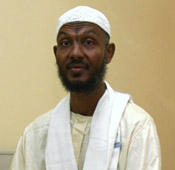In conjunction with the International Freedom of Expression Exchange general meeting, the Norwegian government hosted a Global Forum on Freedom of Expression featuring three days of discussions, seminars, and lectures from leading experts. For me, a highlight was finally meeting Sami al-Haj, at left, the Al-Jazeera correspondent who was held for six years at Guantanamo Bay.
Al-Haj, who was never charged with a crime, was finally released in May 2008 after intensive international advocacy by CPJ and others. He now lives in Doha, were he directs Al-Jazeera’s public liberties and human rights program. In Oslo, he participated in a panel on “Writers in Prison,” along with the renowned Malawian poet, Jack Mapanje.
I spoke to al-Haj after his presentation and told him that it was a privilege to finally meet him. I said that I admired the fact that he seemed to hold no rancor after losing so many years of his life. He thanked CPJ for the letters we wrote on his behalf, which he said his lawyer delivered to him in prison.
With debate over the Guantanamo closing now heating up–sparked in part by reports that former inmates are joining anti-U.S. militant groups–it’s worth noting that al-Haj has become a thoughtful and serious spokesman against U.S. injustice around the world. Precisely because he seems so serene and magnanimous, al-Haj has become a highly public advocate for the rights of Guantanamo prisoners.
Earlier Wednesday, there was a fascinating panel on war and propaganda with journalists who had covered the conflicts in Gaza and Sri Lanka. This made for an interesting comparison. In both cases, the governments had simply excluded the press from the war zone. In both cases, the governments recognized that they faced widespread criticism internationally, but were relatively unconcerned because they had broad support domestically.
A critical strategy for many human rights groups is to challenge governments on the facts (which is why CPJ research must be so rigorous) and make this information available to institutions that help shape international public opinion, including the media.
But what do you when the government in question will not even engage you on this level? What do you do when they don’t even bother to deny what you asserting and are simply willing to concede the field?
It’s a dilemma, for sure, and a new challenge for CPJ. It will not be easy for CPJ and others to influence domestic public opinion outside of the traditional elites that are tied to the international community. But if we want to continue to have an influence on government polices we must find new ways or reaching the mainstream domestic constituencies in countries where press freedom is routinely violated.
